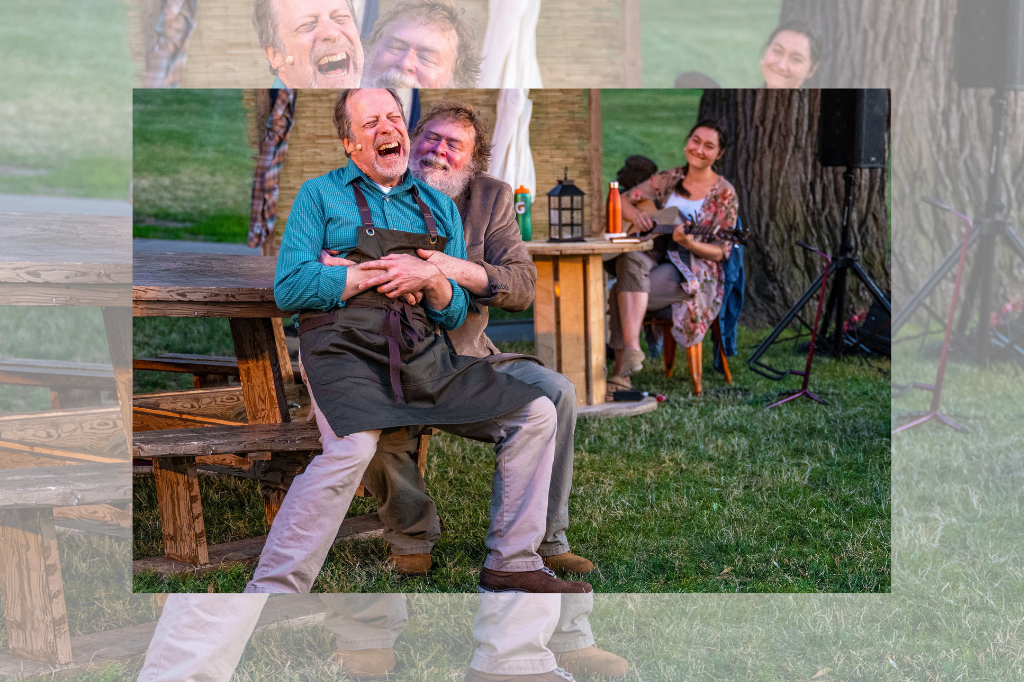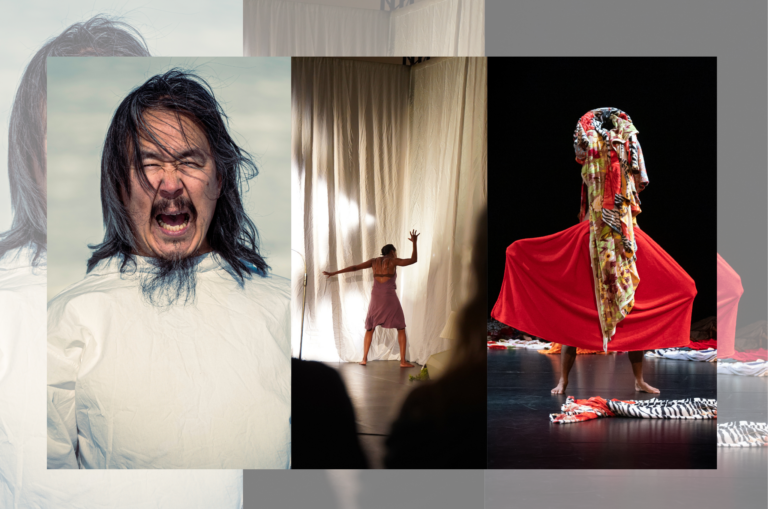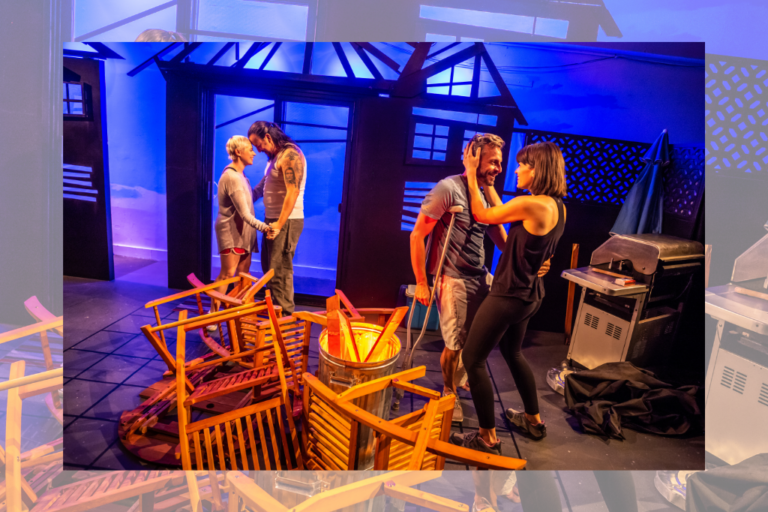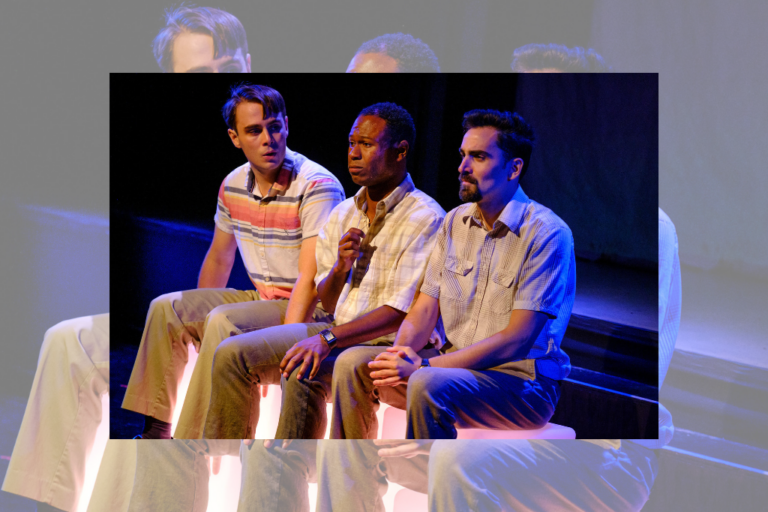REVIEW: King Henry Five at Driftwood Theatre
The Bard’s Bus Tour is back! After a two-year COVID-19 hiatus from in-person performances, Driftwood Theatre is making a welcome return to parks and outdoor spaces around Southern Ontario with King Henry Five — Shakespeare’s Henry IV Part 1 and Part 2 and Henry V, presented as a single evening’s entertainment.
Driftwood Theatre, founded in 1995, is highly regarded for its scaled-back, contemporary interpretations of Shakespeare, which frequently include puppetry, original music, and progressive representations of gender, sexuality, and ethnicity. They are fully on brand here with a production that not only gets away with but revels in its delivery of a complex historical narrative via a five-person, role-swapping cast, along with an onstage musician and efficient backstage crew.
I saw the production at Benares Historic House, a Georgian-style estate in Mississauga. The company played in front of the house with the audience sitting on the lawn in camp chairs, mature trees providing shade from early-evening sun — a lovely environment.
The plays are initially set during the reign of King Henry IV, who fights off a rebellion while his son Prince Hal (later Henry V) spends most of his time in the pub with ne’er-do-well friends. Eventually Hal embraces the responsibility of the crown and leads his country into war with France, but not before betraying his former compatriots.
The play’s setting is the Boar’s Head tavern, here portrayed as a outdoor patio bar with a picnic table as its centrepiece (production design is by Julia Kim). In the first scene, Henry IV (Richard Alan Campbell) sits on the table on a rickety chair representing his throne; the table also becomes a platform for the delivery of heroic speeches and other high-stakes actions. This is one example of a key aspect of D. Jeremy Smith’s production: the invention and re-invention of locations through the economic use and re-use of props and set pieces, and more broadly, the questioning of fixed identities of all kinds.
This strategy flourishes further in the production’s approach to casting. Only one actor, Ben Yoganathan, plays a single character but, aptly, the program lists him as playing two, Hal and Henry V, underlining the character’s trajectory from reckless young prince to conscience-racked king. The other actors move back and forth between characters rapidly, sometimes running offstage and behind the set preparing to reappear as someone else, putting on a new shirt, hat, or apron as they go. A number of actors take turns operating and voicing a puppet representing the character of Boy. All of this is a playful, joyous way to invite the audience into complicity with the storytelling.
The production resists gendered and sexual binaries, as such inviting the audience to question the arbitrary and received nature of such supposed “givens.” Ximena Huizi is non-binary and brings that fluidity to their characters: it was not necessarily clear to me what genders Poins and Hotspur were, nor, I came to appreciate, did that much matter. The point is the sort of person they are, how they behave and speak and relate to others. The tavern-keeper — Mistress Quickly in the original — is here called Quickly and played by Campbell. He is in a relationship with Falstaff (Hume Baugh) and both present as male; no comment is offered about the fact they’re a same-sex couple. This contributes to the production’s focus on the friendship and kinship that bind some of the characters together —the Boar’s Head gang come across as a chosen family — and the historic, cultural/national, and linguistic inheritances that keep others apart.
One moment where the production’s distillation of three plays into one became disconcerting for me was Quickly’s rapid switch of affections from Falstaff to Poins, before the former was even cold in his grave. Perhaps I missed something, but more framing around that new coupling would have been helpful.
The acting company is a mix of newer talents and established figures, and Campbell — a veteran of Toronto’s VideoCabaret as well as previous Driftwood productions — anchors the production with his beautiful, resonant speaking of the text, thoughtful characterizations, and acute emotional and physical presence. My favourite moment in the show was a transition late in Act 1 in which Campbell lays his own bed and gets into it as the dying King Henry IV, an act of ceremony that drew attention to itself in thoughtful, moving ways. Baume is a winningly rambunctious Falstaff and in his second-act guise as Fluellen, busts out a well-observed Welsh accent. Yoganathan brings impressive range to his playing of Hal/Henry: convincingly feckless at first, he draws us into the character’s difficult journey towards maturity, as he betrays and renounces his friends in order to take up his duty as monarch.
Rosalie Tremblay is impressive as she switches between a number of roles including Exeter, Bardolph, and the French princess Catherine. An area where the production faltered for me was the interjection of a Chorus character, played by Tremblay, who performs interstitial songs written by Germaine Konji and Kelsi James, with James accompanying live on guitar. The songs seem intended to draw the audience into the story and comment on it:“Know where you come from and to know who you’ll be / Pere et fils” is the show’s opening lyric, for example. To me, though, the songs sometimes felt superfluous and on-the-nose, pointing out something that the play and production ably communicate otherwise. This is particularly the case in the famous Henry V nighttime episode in which the new king wanders anonymously among his soldiers as they rest up between battles. The significance of this scene – how Henry draws information out of the others by not revealing himself; the insights that emerge about the complexity of being both a monarch and a mortal being – emerges out of the text and performances, and for me was diminished by the lyric “All you have is each other / All you have is tonight.”
Driftwood’s commitment to access is underlined in their pay-what-you-can-afford ticketing model; purchasing a top-price ticket of $75 unlocks two free tickets for community members. Performances continue through the third week of August with the tour ending in Toronto’s Christie Pits Park.
This refreshing take on Shakespearean history is well worth a look.
King Henry Five runs through late August in locations around Southern Ontario. Tickets are available here.















Comments